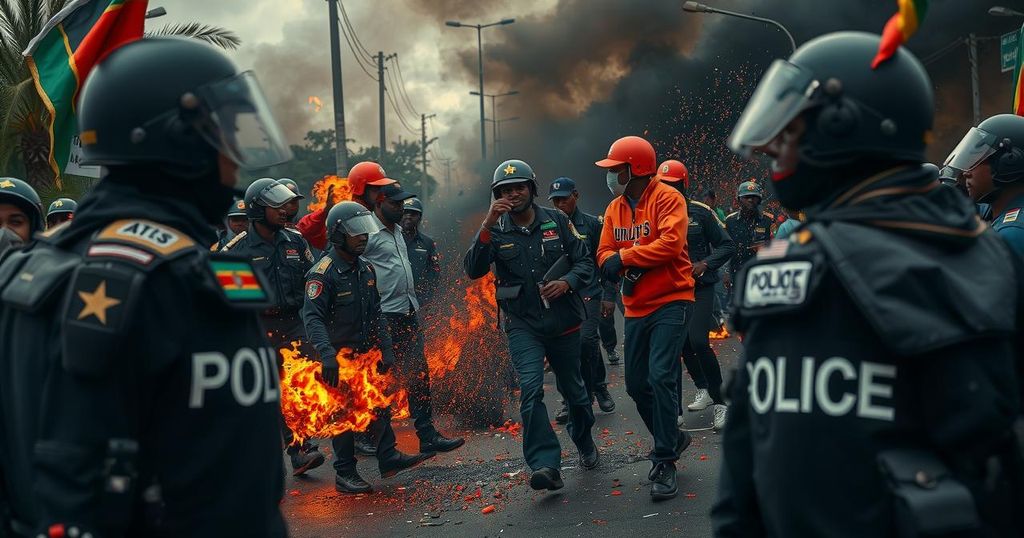World news
AFRICA, ANTONIO, ANTONIO JUAQIM, BBC, COMMISSION, DANIEL CHAPO, DEMOCRACY, ELECTIONS, FR, FRELIMO, MANUEL SAMUEL, MAPUTO, MON, MONDLANE, MOZAMBIQUE, OPPOSITION, PROTESTS, RENAMO, SAMUEL, SAO FRANCISCO XAVIER, SÃO FRANCISCO XAVIER CEMETERY, VE, VENÂNCIO MONDLANE, VIOLENCE
David O'Sullivan
0 Comments
Mozambique’s Election Crisis: Tragic Deaths Highlight Political Turmoil
The recent electoral crisis in Mozambique has led to violent protests, particularly affecting children and young people. Notable incidents include the killing of a 16-year-old boy during a demonstration against the ruling Frelimo party’s election victory. Human Rights Watch has reported the deaths of approximately 40 individuals, including children, due to police actions in the ensuing protests. The situation reflects widespread discontent with the current political climate and calls for justice and reforms in Mozambique.
In Mozambique, the political unrest following the recent presidential elections has culminated in tragic violence, particularly impacting younger populations. Notably, a 16-year-old named Antonio Juaqim was killed during a protest where citizens expressed their dissent by banging pots and pans. This public demonstration was a response to the electoral commission declaring the ruling Frelimo party the winner, a result that has been vehemently contested by opposition figures and activists. The protests have sadly resulted in numerous fatalities, including at least ten children, as alleged by Human Rights Watch, igniting widespread outrage and grief among the populace.
The electoral process has been marred by claims of manipulation, prompting opposition leader Venâncio Mondlane, who fled the country fearing persecution, to call for continued protests. He maintains that the electoral results reflect a flawed system that does not represent the will of the people. Nightly protests have now shifted from public streets back to homes, where the symbolic noise of pots being banged resonates throughout Maputo. Antonio’s death, along with others, highlights the perilous reality of asserting political opinions in Mozambique’s current climate, where dissenters face drastic repercussions. Recent estimates suggest that at least 40 individuals have lost their lives amid these protests, igniting fears that the state’s law enforcement is escalating their level of violence against civilians.
In response, police officials have defended their actions, claiming that they were compelled to act in self-defense amid aggressive protests. Critics of the police, however, assert that excessive force is being utilized to suppress legitimate dissent and protect the interests of the ruling party. As tensions escalate and calls for accountability persist, it remains apparent that the legacy of the independence movement has become overshadowed by the immediate demands for better living conditions and future opportunities for Mozambique’s youth.
The current political atmosphere in Mozambique is fraught with tension following the recent presidential election held on 24 October. Frelimo, the party in power since the country’s independence nearly fifty years ago, has been accused of orchestrating electoral fraud to secure a decisive victory over independent candidate Venâncio Mondlane. This political discontent has manifested in a significant public outcry, especially among younger citizens who are increasingly dissatisfied with the governance and its implications on their future. As such, the current protests are not only aimed at the electoral process but also reflect broader societal grievances regarding economic opportunities and social justice.
The ongoing protests in Mozambique represent a critical juncture in the nation’s political trajectory, as citizens openly grapple with the implications of a disputed electoral outcome. The unfortunate deaths of young individuals during these protests have incited a strong response from both human rights groups and the general populace, demanding accountability and a reassessment of state power. As the situation remains fluid, it is evident that the calls for justice and reform will only intensify, highlighting the urgent need for dialogue and change in the governance of Mozambique. With a rising wave of discontent, the fate of Mozambique’s political landscape may hinge on the government’s willingness to address the root causes of this unrest, particularly those related to youth aspirations and civic engagement.
Original Source: www.bbc.com




Post Comment